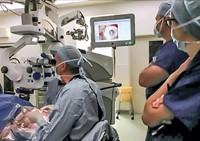Advertisement
Grab your lab coat. Let's get started
Welcome!
Welcome!
Create an account below to get 6 C&EN articles per month, receive newsletters and more - all free.
It seems this is your first time logging in online. Please enter the following information to continue.
As an ACS member you automatically get access to this site. All we need is few more details to create your reading experience.
Not you? Sign in with a different account.
Not you? Sign in with a different account.
ERROR 1
ERROR 1
ERROR 2
ERROR 2
ERROR 2
ERROR 2
ERROR 2
Password and Confirm password must match.
If you have an ACS member number, please enter it here so we can link this account to your membership. (optional)
ERROR 2
ACS values your privacy. By submitting your information, you are gaining access to C&EN and subscribing to our weekly newsletter. We use the information you provide to make your reading experience better, and we will never sell your data to third party members.
Pharmaceuticals
RNA Drug Firms Attract Deals
Pharmaceuticals: Recent successes help boost emerging therapeutic field
by Ann M. Thayer
January 20, 2014
| A version of this story appeared in
Volume 92, Issue 3

Small companies developing RNA-based therapeutics are finding eager partners. In less than a week, Alnylam Pharmaceuticals, Santaris Pharma, and Moderna Therapeutics announced drug development agreements totaling more than $1 billion.
The deals follow a year of significant accomplishments, says Cowen & Co. stock analyst Nicholas Bishop. He points to advances in RNA drug delivery and FDA approval of the first RNA-based drug, the cholesterol fighter Kynamro developed by Isis Pharmaceuticals and Genzyme.
Now, Genzyme is putting $700 million into Cambridge, Mass.-based Alnylam in exchange for a 12% ownership stake. Alnylam will also receive R&D funding and potential milestone payments in a collaboration focused on rare genetic diseases.
At the same time, Alnylam will spend $175 million up front and more in milestones to acquire Merck & Co.’s Sirna Therapeutics subsidiary, which Merck bought in 2006 for $1.1 billion. Both Alnylam and Sirna focus on RNA interference (RNAi), which uses doubled-stranded RNA to silence genes and deactivate disease-related protein production.
Alnylam CEO John Maraganore calls the Genzyme relationship a “game changer” for advancing RNAi therapeutics. And the acquisition of Sirna’s technology will build on significant progress Alnylam has made in RNA drug delivery, he adds.
Meanwhile, Denmark’s Santaris, which uses single-stranded RNA to make locked nucleic acid drugs, has just signed up two collaborators. Roche will pay an initial $10 million to look at several disease targets and up to $138 million in milestone payments per resulting product. And GlaxoSmithKline will work with Santaris on three targets.
Moderna has struck a similarly structured deal, in the rare disease area, with Alexion Pharmaceuticals. Besides making a $25 million investment in Moderna, Alexion is paying $100 million for the option to develop 10 product candidates. For optioned products, Moderna will also receive milestone payments.
Instead of silencing genes, Moderna designs RNA-based drugs to turn on protein production. Cash-rich from a 2013 financing round and a $240 million deal with AstraZeneca, Moderna is also creating a new company, Onkaido Therapeutics, and funding it with $20 million. With 15 preclinical candidates in hand, the new firm will focus on developing RNA-based oncology therapies.
Although Merck is stepping back from RNA-based drugs, other big pharma firms, like Roche, are showing renewed interest in the field. “There was a lot of premature excitement in the mid-2000s,” Bishop says. “It was clear that there was a lot of promise, but maybe an underestimation of some of the challenges.”
Now, with a drug on the market, some of that risk is gone. “These companies are showing that genetically targeted RNA-based therapies are a real and valid treatment modality,” Bishop adds, “and are probably going to be a fertile class of drugs for a lot of genetic diseases.”



Join the conversation
Contact the reporter
Submit a Letter to the Editor for publication
Engage with us on Twitter